RA Thermoseal 50gm
RA Thermoseal 50gm
Composition:
Potassium Nitrate 5% w/w in toothpaste/gel base. Sodium monofluorophosphate 0.7% w/w (available fluoride content 917 ppm when packed).
Understanding the tooth structure:
For an effective management of dentinal hyprsensitivity, it is essential to understand the tooth structure and the roles of enamel, dentin, and pulp, as well as how they contribute to or are affected by tooth sensitivity.
1. Enamel:
a. Enamel is the outermost layer of the tooth, and it is the hardest and most mineralized tissue in the human body.
b. Enamel serves as a protective shield for the more sensitive inner layers of the tooth, primarily dentin and pulp.
c. It is a non-living tissue and is devoid of nerve endings, which means it does not transmit pain or sensations.
2. Dentin:
a. Dentin is located beneath the enamel and makes up the bulk of the tooth structure.
b. It is a living tissue, containing microscopic tubules that extend from the outer surface of the dentin (adjacent to the enamel or cementum) to the pulp chamber in the center of the tooth.
c. These dentinal tubules house nerve endings and fluid-filled channels, connecting to the dental pulp.
d. Dentin is responsible for transmitting sensations or pain to the pulp when it is stimulated by external factors.
3. Pulp:
a. The pulp is the innermost portion of the tooth, residing in the pulp chamber and extending into the root canals.
b. It contains vital components like blood vessels, nerves, and connective tissues.
c. The pulp is responsible for nourishing and maintaining the tooth, as well as detecting and responding to external stimuli.
d. When dentin is exposed or irritated due to factors like enamel erosion, gum recession, or tooth decay, the pulp may transmit pain signals, causing tooth sensitivity.
In relation to tooth hypersensitivity:
- Enamel erosion or loss can expose the underlying dentin to external stimuli, which can lead to hypersensitivity. Enamel acts as a protective barrier, and when it is compromised, it can no longer shield the dentin from temperature changes, acidic foods, or pressure.
- Dentin, with its tubules and nerve endings, is the primary culprit in tooth sensitivity. When the dentinal tubules are open or exposed, they can transmit sensations and pain to the pulp, causing discomfort or sharp pain.
- The pulp is the nerve center of the tooth, and it plays a crucial role in sensing and responding to external stimuli. When it receives signals from the dentin due to hypersensitivity, it may trigger pain responses, leading to the discomfort associated with sensitive teeth.
In summary, enamel protects the inner tooth structures, dentin contains the nerve endings responsible for tooth sensitivity, and the pulp is the central nervous system of the tooth that responds to external stimuli. Understanding the roles of these tooth structures is important in managing and addressing hypersensitivity.
Dentinal hypersensitivity (Sensitive teeth)
Dentinal hypersensitivity, also known as tooth sensitivity or sensitive teeth, is a common dental condition where an individual experiences short sharp pain arising from exposed dentin in response to stimuli, typically thermal, evaporative, tactile, osmotic, or chemical, and which cannot be ascribed to any other form of dental defect or pathology. This discomfort typically originates from the dentin, which is the inner layer of the tooth, lying beneath the protective enamel and cementum.
Common triggers:
Dentin contains tiny tubules that connect to the nerve endings in the dental pulp, and when these tubules are exposed or stimulated, it can lead to tooth sensitivity. Common triggers for dentinal hypersensitivity include:
1. Hot or cold foods and beverages.
2. Sweet or sour foods.
3. Cold air or cold water exposure.
4. Brushing or flossing teeth.
5. Pressure from biting or chewing.
Etiology:
There are several potential causes of dentinal hypersensitivity, including:
1. Tooth enamel erosion: Enamel is the outermost layer of the tooth, and if it wears away due to factors like acid erosion from acidic foods or beverages, tooth grinding (bruxism), or aggressive toothbrushing, it can expose the dentin.
2. Gum recession: When the gum tissue recedes, it exposes the tooth roots, which are not protected by enamel. The dentin on these exposed areas is more susceptible to sensitivity.
3. Tooth decay or cavities: If cavities form and progress to the dentin, it can cause sensitivity.
4. Cracked or chipped teeth: These can create pathways for stimuli to reach the dentin, causing sensitivity.
Management of dentinal hypersensitivity:
To manage dentinal hypersensitivity, individuals can try various approaches, including:
1. Using desensitizing toothpaste: Special toothpaste formulations contain compounds like potassium nitrate or fluoride that can help block the tubules in the dentin, reducing sensitivity.
2. Avoiding acidic and abrasive foods: Minimizing consumption of acidic foods and drinks and using a soft-bristle toothbrush can help prevent further enamel erosion.
3. Good oral hygiene: Maintaining regular oral hygiene practices, such as proper brushing and flossing, can prevent the development of cavities and gum disease.
4. Dental treatments: In some cases, a dentist may recommend treatments like fluoride varnishes, bonding, or dental sealants to address sensitivity.
It’s essential to consult a dentist if you experience persistent or severe dentinal hypersensitivity to determine the underlying cause and receive appropriate treatment. Your dentist can provide guidance on managing and addressing your specific condition.
Mode of Action:
RA Thermoseal provides relief from dentinal pain by forming a neurosensory block. Fluoride ensures tooth surface remineralization. It reduces the demineralization of enamel and dentin by decreasing the acid production of bacterial plaque and decreases the solubility of apatite crystals. It readily becomes incorporated as fluoroapatite layer, to reduce the dissolution of apatite during acid attacks.
Potassium Nitrate and Sodium Monofluorophosphate based toothpastes are recommended by the standard textbooks as the first line treatment for dentinal hypersensitivity.
Indications:
1. Patients complaining of sensitive teeth. (Dentinal hypersensitivity).
2. Post-scaling sensitivity.
3. In tooth whitening treatments. Patients can start RA Thermoseal 2 weeks before the tooth whitening appointment.
Directions:
Adults and children over 12 years of age should apply at least 2.5 cm (1”) strip of the product to a soft or ultrasoft bristle toothbrush. Brush teeth to clean all surfaces thoroughly with RA Thermoseal toothpaste/gel at least twice a day (morning and evening), or as recommended by a dentist or doctor. Make sure to brush sensitive areas for a longer time.
Uses:
1. Builds increasing protection against sensitivity of teeth to cold, heat, acids, sweets or contact.
2. Helps in the prevention of dental cavities.
Warnings:
For usage beyond 4 weeks, please consult a dentist or doctor. Keep out of reach of children under 6 years of age. Stop use and ask a dentist if the problem persists or worsens.
Presentation:
Lamitube of 50g (1.76 oz) / 100g (3.52 oz), Gel in lamitube of 100g (3.52 oz).
Only for Doctors
Compare
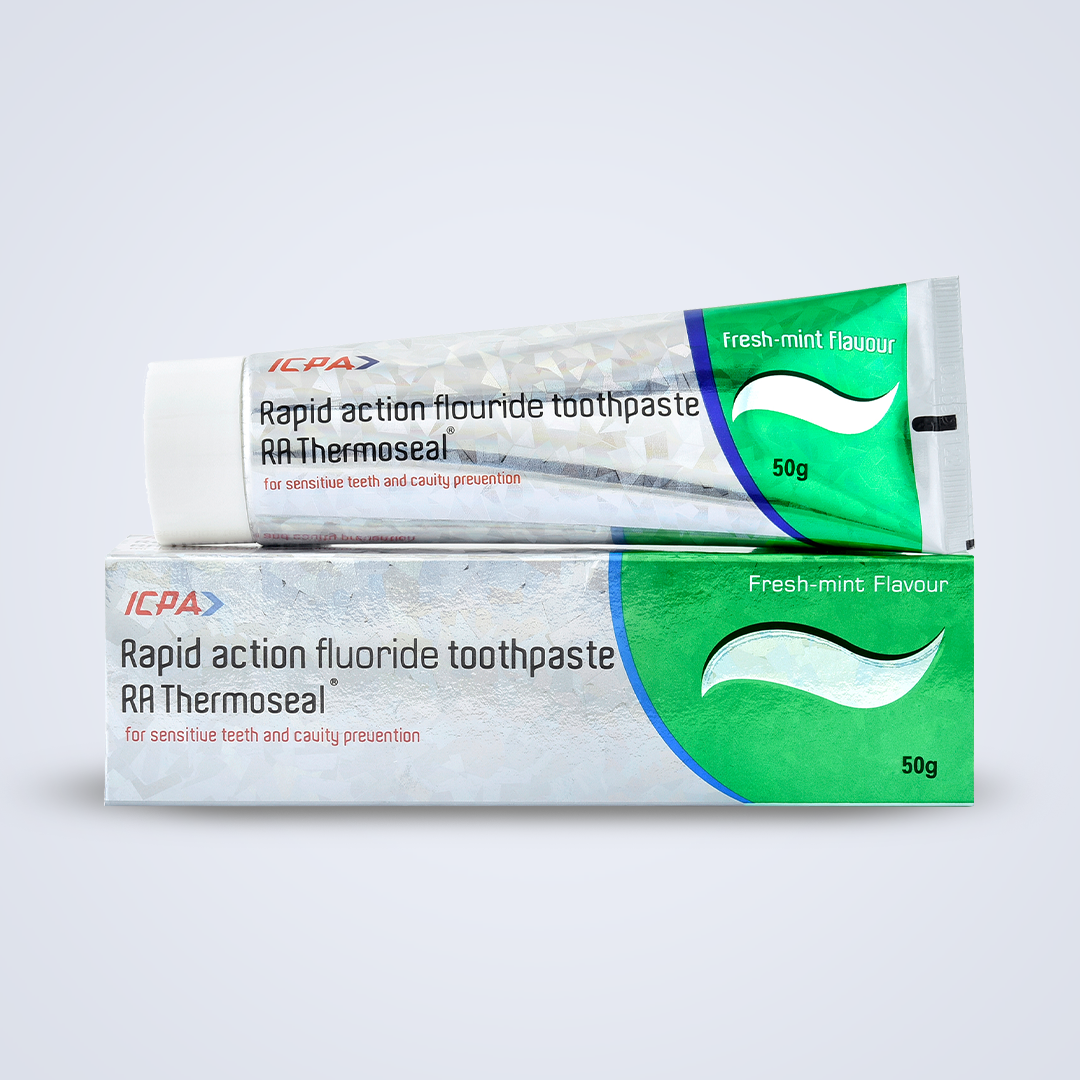
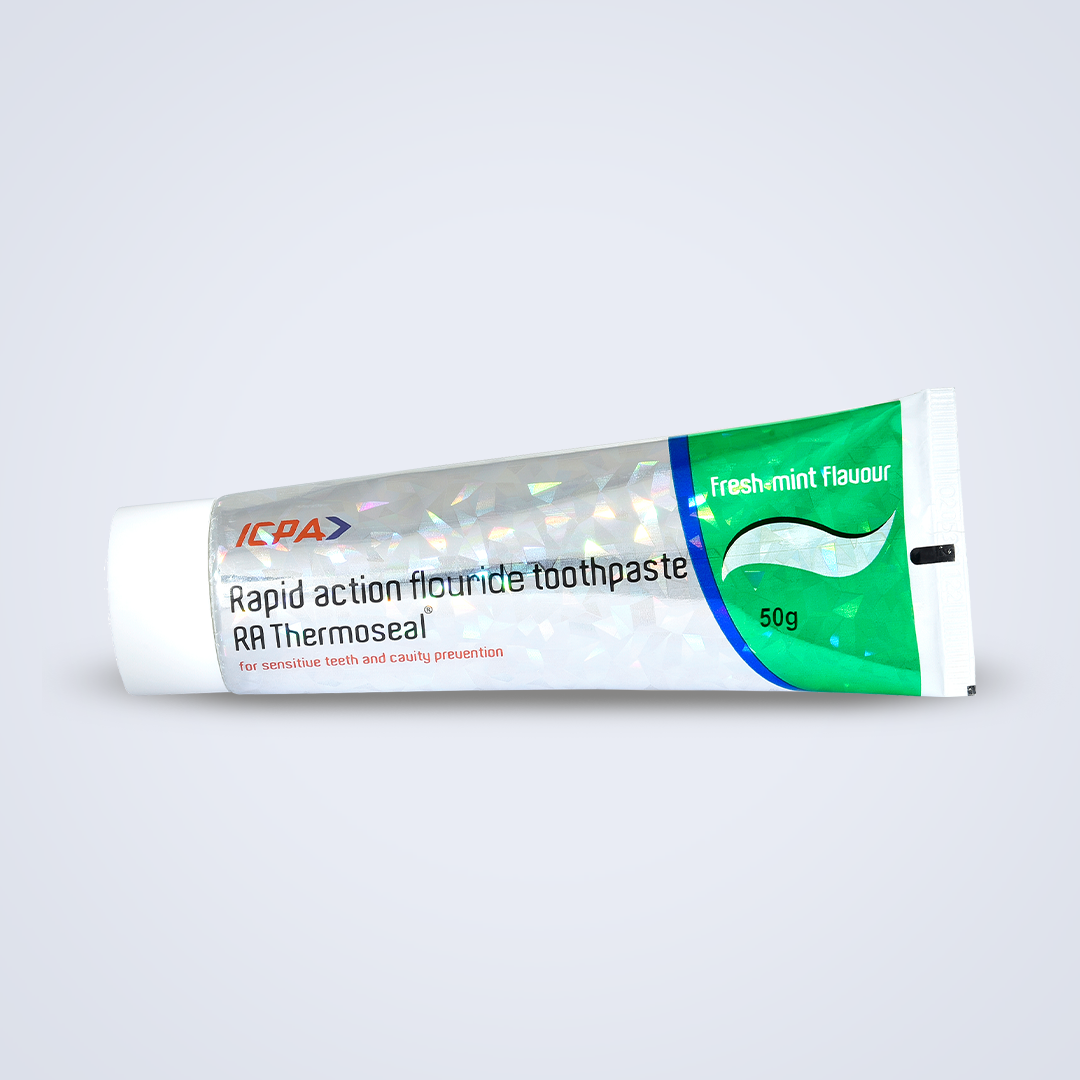
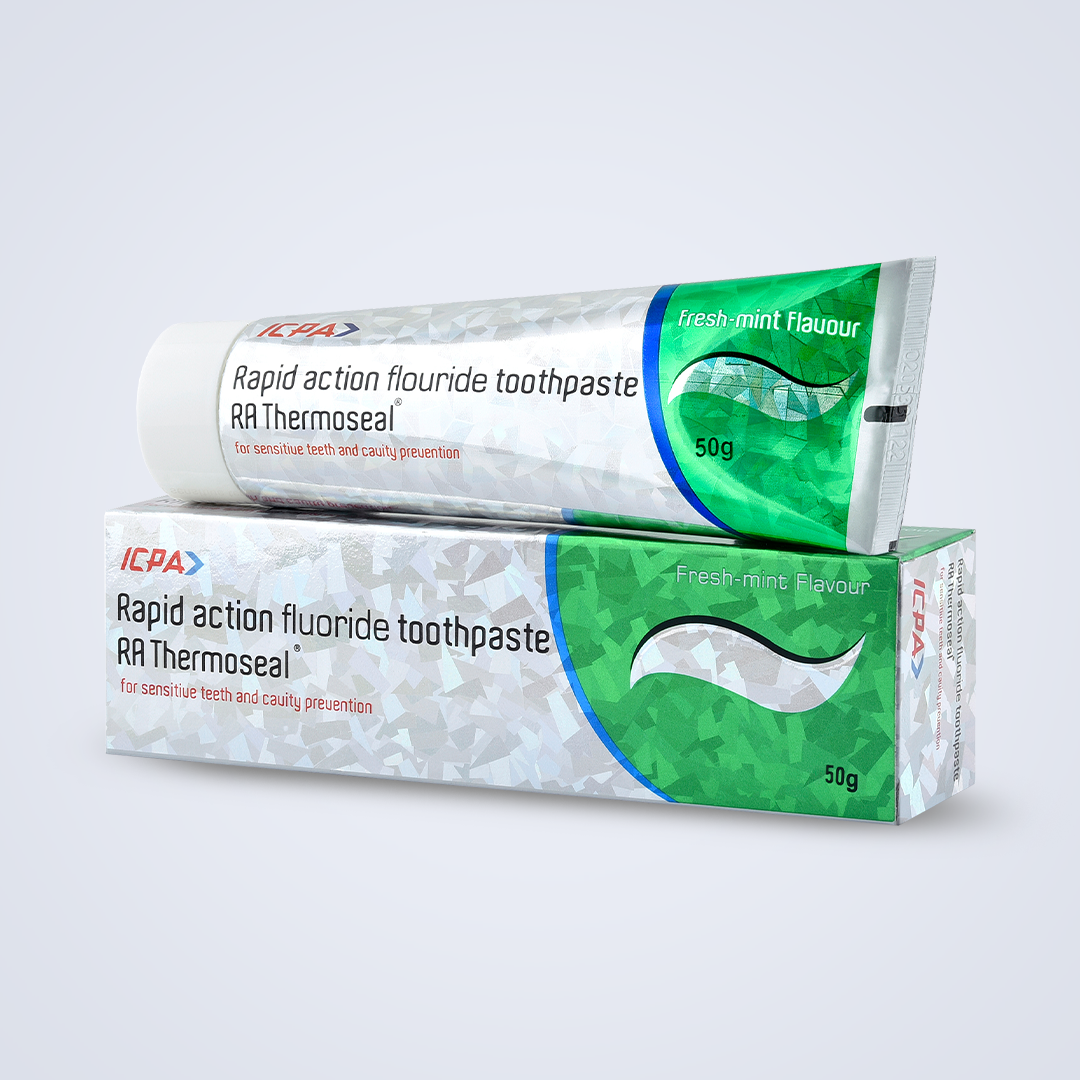
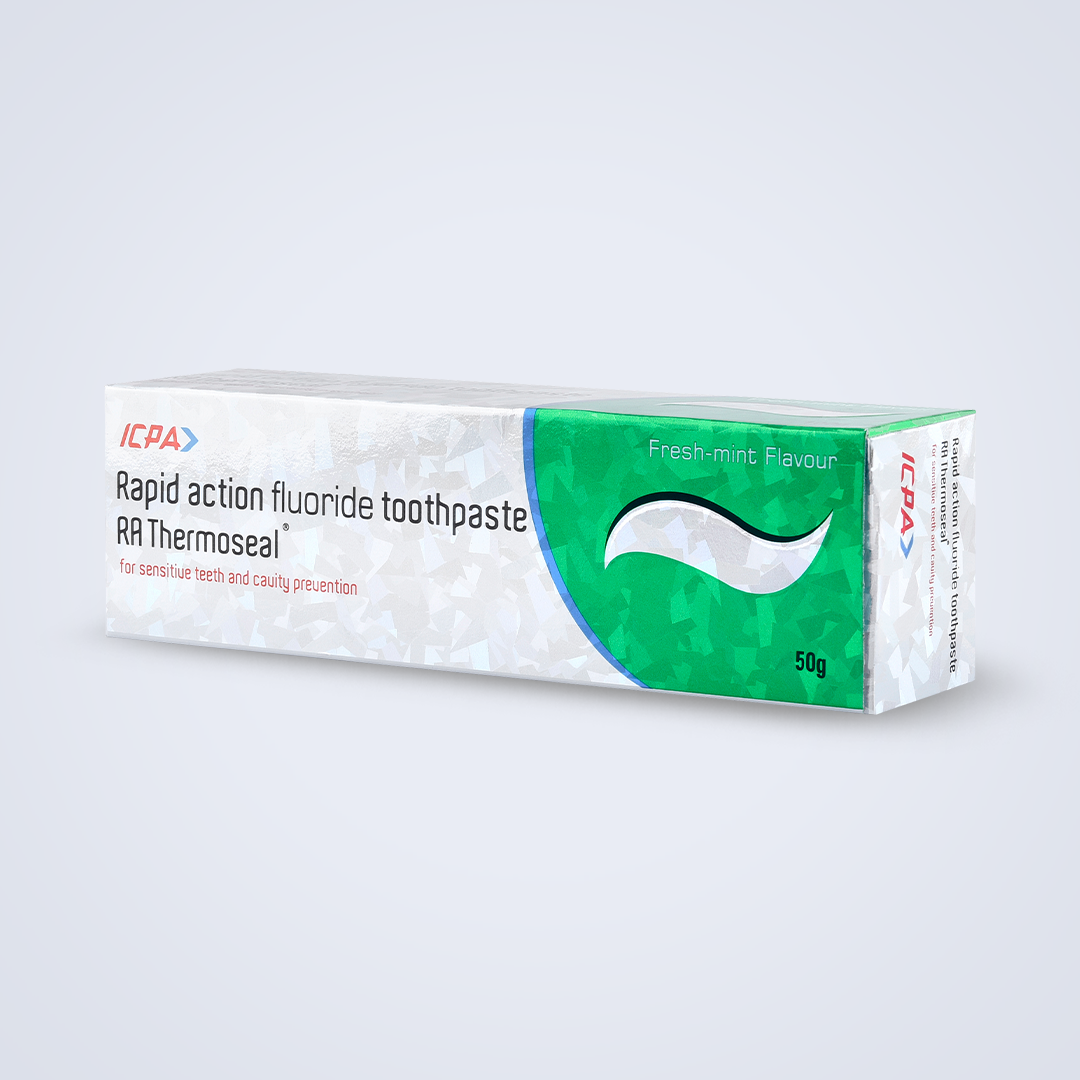
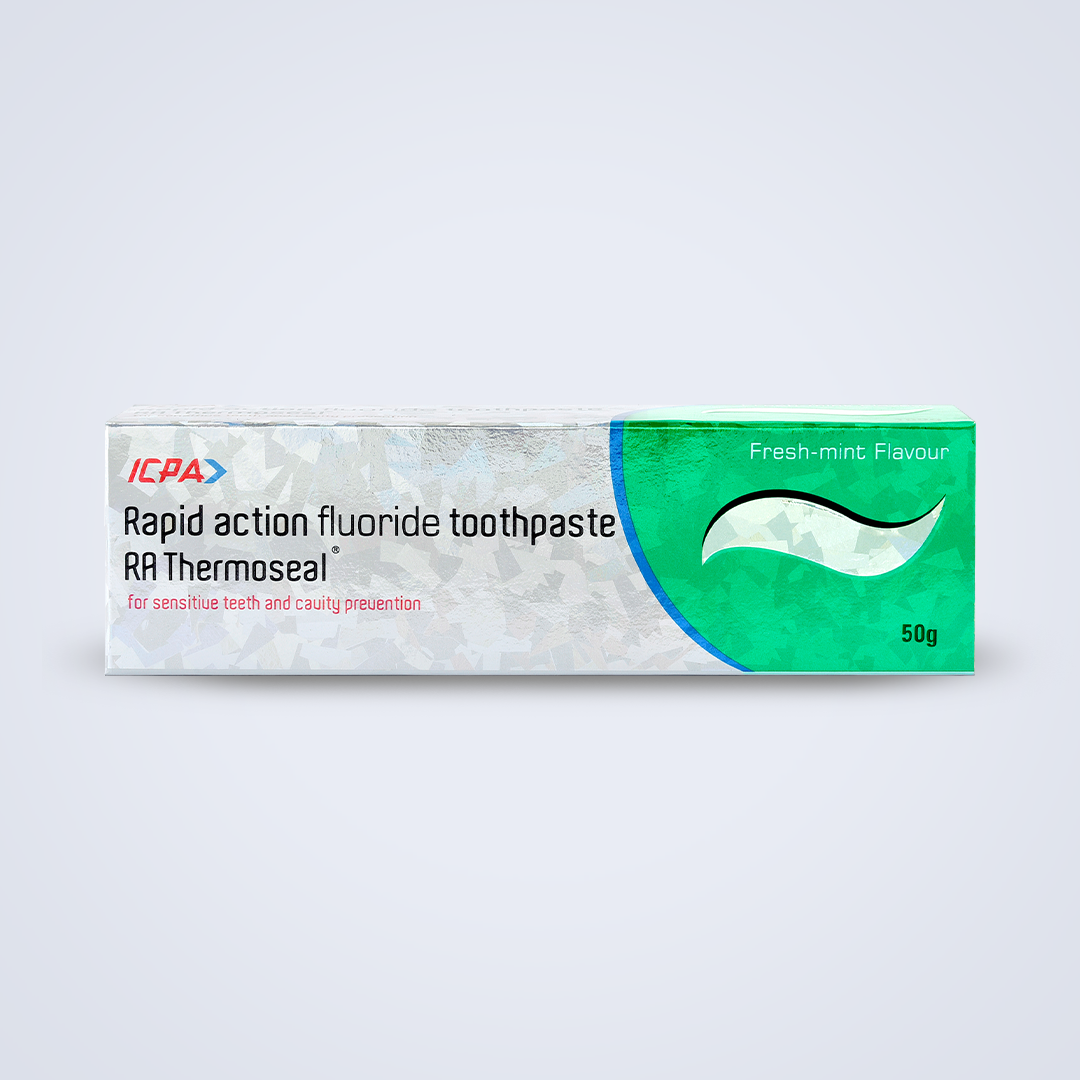
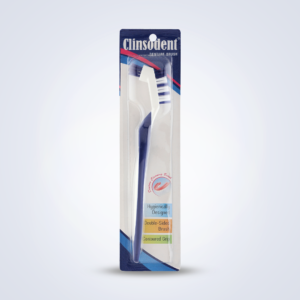
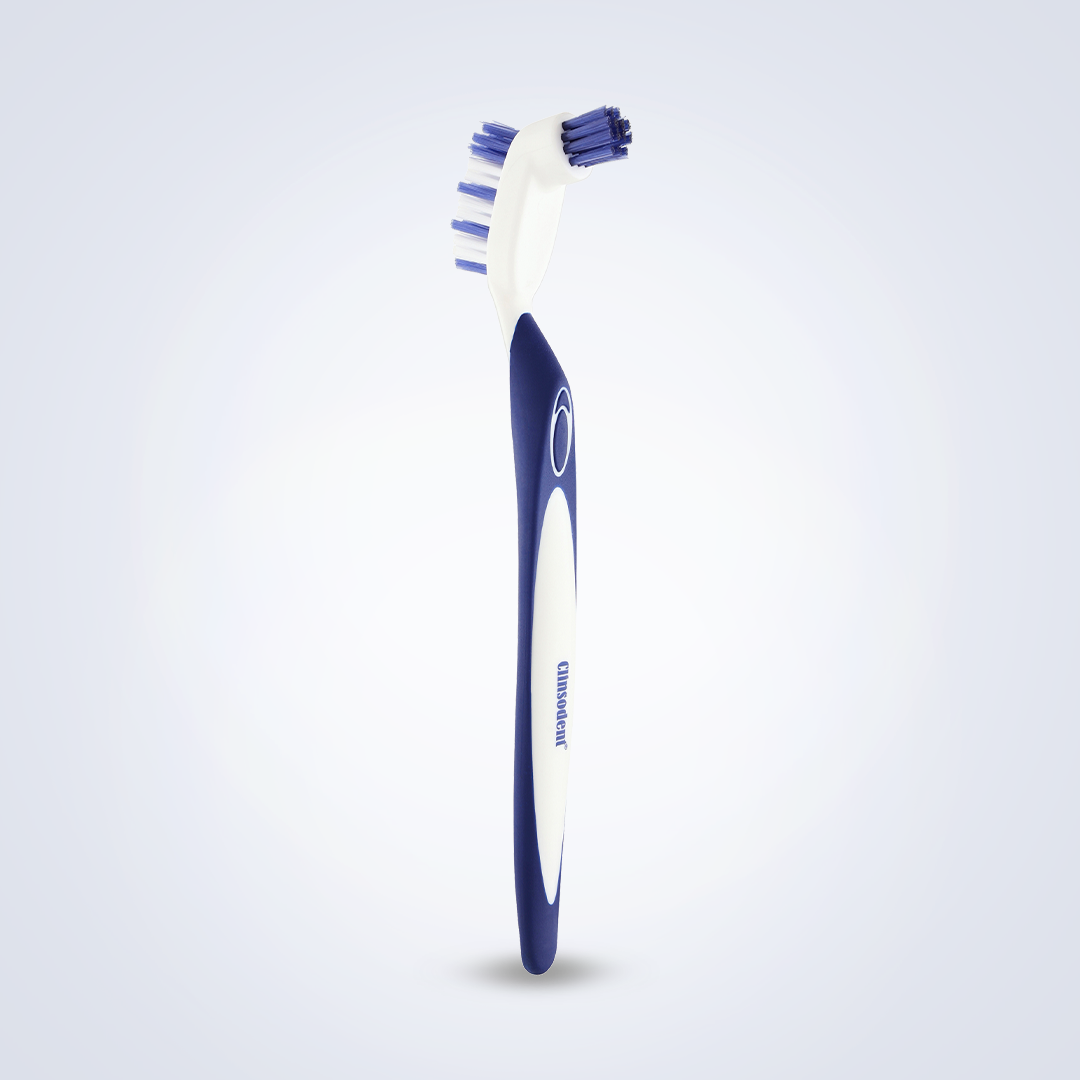
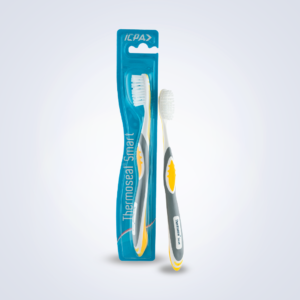
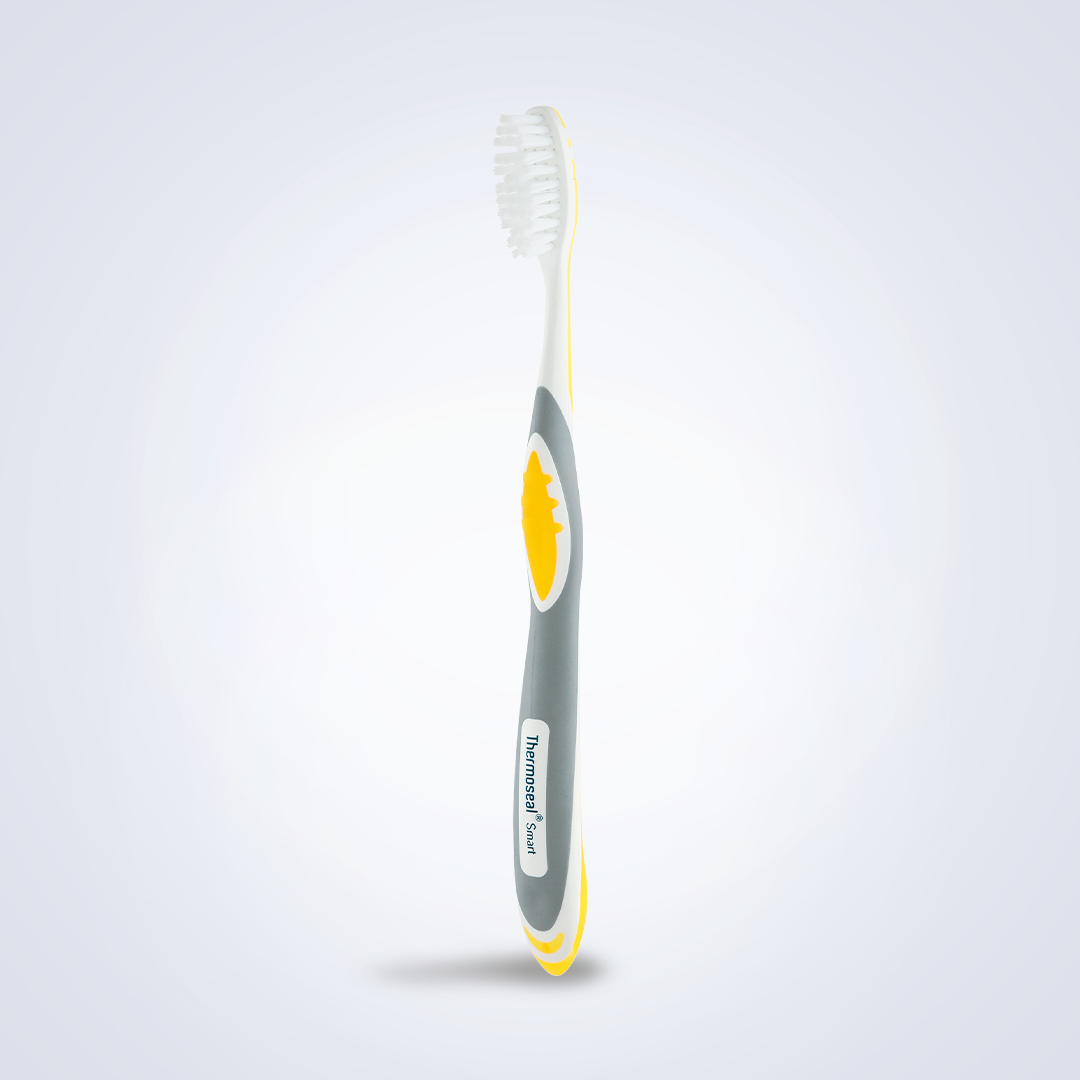
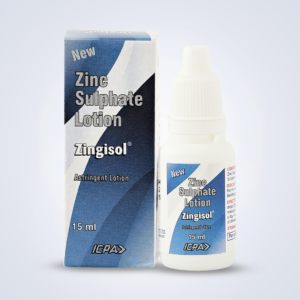
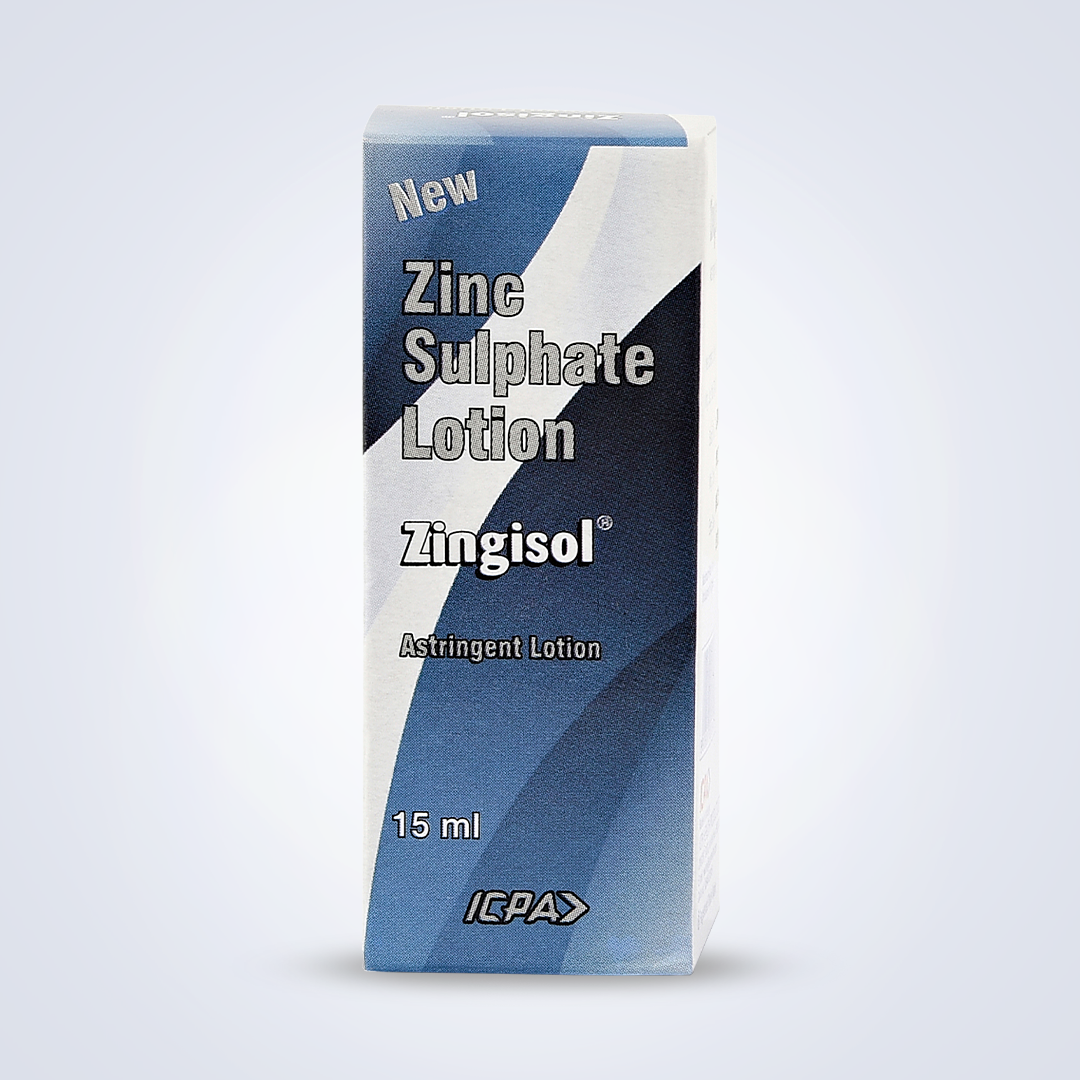
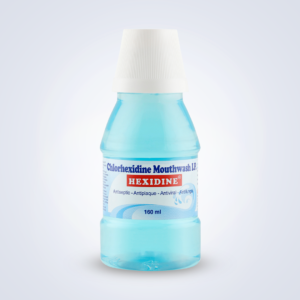
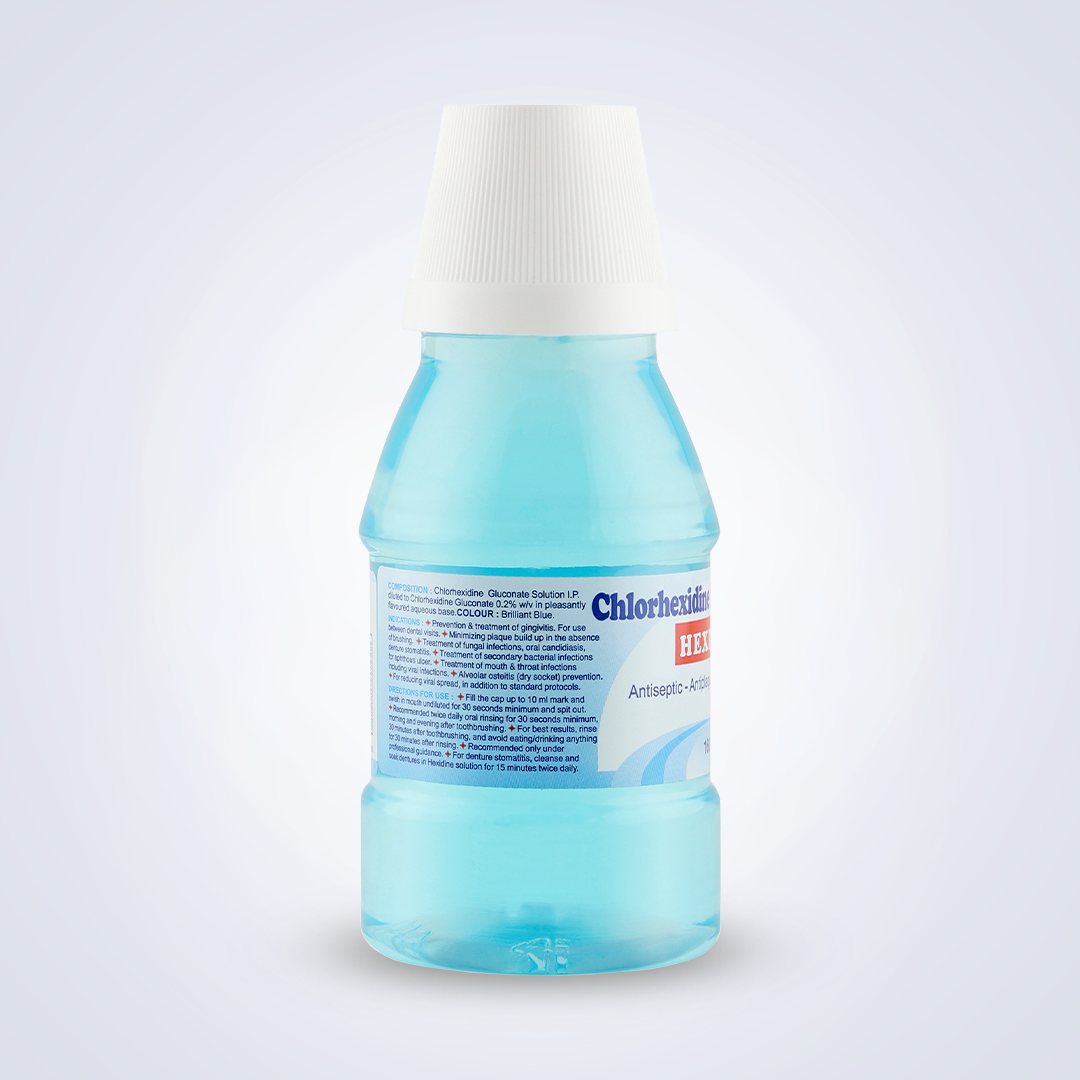

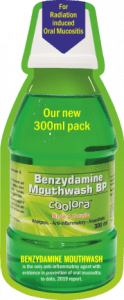
Mohamed Najeeb –
Sir/Madam, Is it available at Nagercoil – 629001 TamilNadu
bittookumar –
Good i like
Kavita –
Is this toothpaste is also working to stop bleeding in teeth.pls advise
Jaydeep –
What is the difference between RA Thermoseal toothpaste(the one shown in a above picture – Silver &Green Color package) And RA Thermoseal Gel (Sky blue and bright green package – I was unable to locate the same product on your website)? I’m trying to find whether the product(RA Thermoseal Gel -Blue Green package) is genuine or not. please suggest.
ICPA Health –
One is RA Thermoseal in paste form and the other is in gel form. Yes RA Thermoseal gel is genuine .Thank you for writing to us.
subhash –
Howmuch time does ra thermoseal takes to releive from pain
ICPA Health –
Sir,
In a recent study it has been concluded the RA Thermoseal provides relief from pain from Day 1. You can refer to the study in our blog section. Thank you
Jitender Chauhan –
Very good toothpaste for hypersensitivity and betterment of gums.
Kamal –
Is this toothpaste helpful in removing yellowish from teeth ?
Kiran –
I have the shocking sensation, which I don’t feel all the time, can thermoseal Ra help me to solve my problem, or should I use any other tooth paste
ICPA Health –
Yes, RA Thermoseal will help you.
ICPA Health –
This toothpaste helps in hyper sensitivity
Kuldeep khattra –
Nice one thanks
Priyanka –
My dentist told me to use it in the area of sentivity and to not rinse it. Is it harmful if swallowed?
ICPA Health –
RA THERMOSEAL is a toothpaste to be used for reducing the tooth sensitivity.
so the patient has to follow the directions for use written on the pack. RATH not to
be swallowed.
HI –
One of the best toothpastes.
sushmita bhatta –
Is it available in nepal ??
ICPA Health –
Yes , it is available in Nepal
Saurabh –
Is this toothpaste vegetarian?
kirti –
I have gone through the teeth filing for dental bridge and askked to apply this tooth paste and than eat. Will it really help. Its just the first day
Kaushik S –
i am using this toothpaste from 1.5years approx., even though i was advised to use it for 3months from my doctor. Since it was working fine for me, i continued using it. Sensitivity is improved now but sometimes it pains suddenly and reduces in 2 or 3 days automatically. Is it harmful to continue to use further.?
ICPA HEALTH PRODUCTS LTD –
Thank you for writing to us
For usage beyond 4 weeks, please consult a dentist or doctor.
ANANT DEHADRAY –
This toothpaste is VEG or not VEG not declared in pack
Please concern
ICPA Health –
Yes
Chamikara –
Doctor told to keep this applied for teeth for 1 hour 4times per day,, is that ok to use this medicine as such??
ICPA HEALTH PRODUCTS LTD –
Thank you for writing to us
Kindly use this Toothpaste as recommended by dentist or doctor
Priscilla –
Tooth paste helps to relive pain. But can we continue using for long time ?
ICPA HEALTH PRODUCTS LTD –
Thank you for writing to us
Kindly use this Toothpaste as recommended by dentist or doctor.
Bhagyashri –
It is best for sensitivity.I want to know does it really prevent from cavity?
ICPA HEALTH PRODUCTS LTD –
Thank you for writing to us
Kindly use this Toothpaste as recommended by dentist or doctor